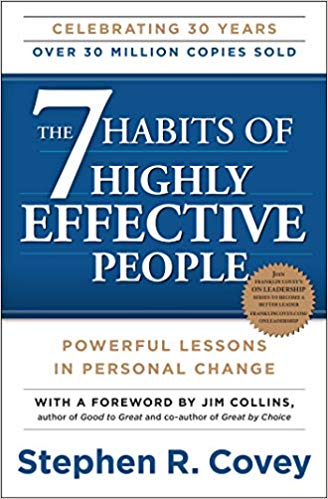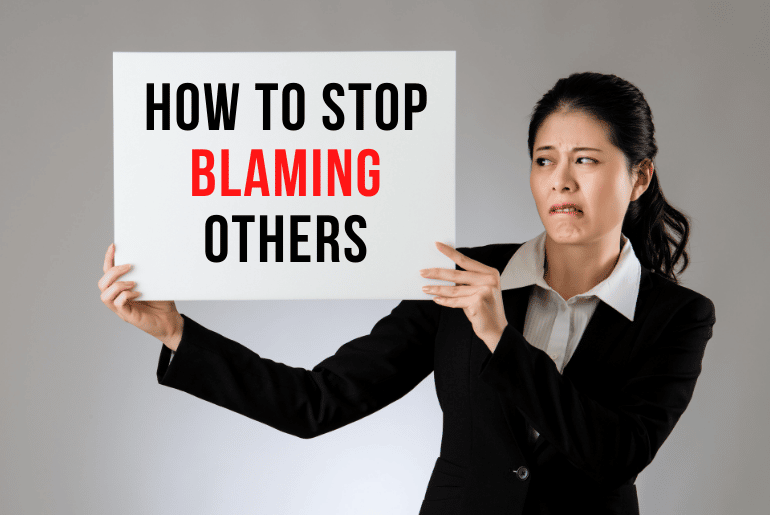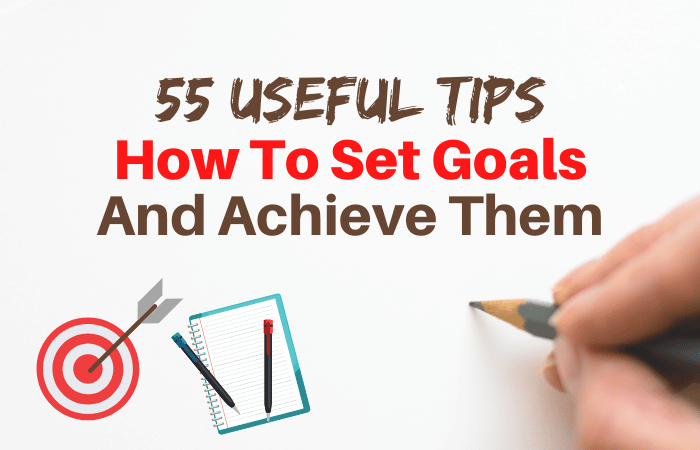Have you ever blamed someone for something? Do you take 100% responsibility for everything that has happened in your life? Before you answer these 2 questions, take a few minutes to really think about everything that has happened in your life. Are you someone who always plays the blame game, or are you someone who takes full responsibility for everything?
If you want to succeed and live a better life, you must learn how to stop blaming others, stop complaining, and instead, learn how to take responsibility and ‘own’ everything that has happened to you in life.
Here’s a good story to illustrate how the blame game works…
- Teacher: Where’s your homework?
- John: Sorry, sir, I couldn’t do it because there was too much noise at home,
- Teacher: What? Noise all evening? What kind of noise?
- John: It was the television, sir. It was too loud, and I couldn’t do my homework.
- Teacher: Now John, you could have asked them to turn down the volume, surely?
- John: No, I couldn’t. There was no one else in the room.
We all blame at some point. Because it is always easier to point the finger at someone so that we don’t have to be responsible for the situation.
Think about why you fail to achieve your goals or materialize your dreams. If you’re someone who always blames, then you will find an excuse and blamed something.
Here are some of the most common excuses why people are not living their dream life…
- “I’m too busy to pursue my dreams.”
- “I’m too old for that” or “I’m too young to do it. No one will trust me.”
- “The competition is too high.”
- “I don’t have the capital to start.”
- “I’m not smart enough” or “I’m not talented enough.”
Read: 13 Lousy Excuses that Prevent You From Succeeding in Life
The moment you make excuses and the moment you blame others, you are giving away your power to be in charge.
I like this saying from Jack Canfield:
“For every reason it’s not possible, there are hundreds of people who have faced the same circumstances and succeeded.”
So, stop playing the blame game and don’t make lousy excuses. If you want to succeed in life and do better, you need to make fewer excuses and start to take responsibility for everything that has happened in your life.
Here’s how you can stop blaming others and start taking control of your life…
1. Be Conscious

First, try to be conscious of your thoughts. This is not easy, but if you can be aware of how you think, you can stop the blame game altogether.
You cannot fix what you don’t know is broken. Hence, if you want to stop blaming others, you need to first be conscious that you are doing it.
When you are aware you’re playing the blame game, you can stop immediately and change your thoughts. And one good way to practice consciousness is by being mindful. Here are some simple tips on how to practice being mindfulness:
- Pay attention to the things you do. If you are drinking coffee, smell the coffee and taste it.
- Live in the moment. Intentionally slow down and bring your focus to everything you do.
- Accept yourself. Treat yourself the way you would treat a good friend.
- Practice meditation.
- Focus on your breathing. Take deep breaths and focus on your breathing.
2. Stop for a Moment

When you are in an argument or are about to start blaming others, stop for a moment. When you stop, you allow yourself to think about the situation. You are allowing yourself to stay conscious and be aware of what’s going on.
This is why taking a deep breath, taking a walk, or walking away from a tense situation work. When you stop for a moment, you are breaking the pattern give yourself time to study the situation.
For example, when you are blaming others, stop for a moment. Think about what you have done and what has led you into doing so.
The moment you do that, you break the pattern, and you will realize you are playing the blame game. This allows you to stop immediately and turn the situation around.
But, how do you stop for a moment? There are many ways how you can do this…
Practice taking deep breaths. When something happens, you don’t have to jump to a conclusion immediately. Instead, take 3 to 5 deep breaths. This gives you time to study the situation before you make any harsh decisions or blame others.
Walk away from the situation. That’s right, getting yourself out of the situation doesn’t mean you’re escaping. Instead, it buys you time to truly think about a situation so that you will never get the chance to blame others.
Observe what is going on inside you. Keep an eye on your feelings. What is the story you are telling yourself? And what physical sensations (touch, sight, hearing, taste, smell) are you aware of?
3. Replace Blaming with Understanding

One of the most powerful techniques to stop blaming others is empathy. Put yourself in someone’s shoes and you will understand him or her better.
For example, when you’re driving and someone overtakes you, don’t blame him or her. Instead, put yourself in his or her shoes. Think about why he wants to overtake you. Maybe he is in an emergency, right?
When you replace blames with empathy, you will understand the situation and will never start the blame game.
In his best-selling book, The 7 Habits of Highly Effective People, Stephen Covey shared a concept called Paradigm Shift. This was what he wrote in the book…
“I remember a mini-paradigm shift I experienced one morning on a subway in New York. People were sitting quietly – some reading newspapers, some lost in thought, some resting with their eyes closed. It was a calm, peaceful scene.
Then suddenly, a man and his children entered the subway. The children were so loud and rambunctious that instantly the whole climate changed.
The man sat down next to me and closed his eyes, apparently oblivious to the situation. The children were yelling back and forth, throwing things, and even grabbing people’s papers. It was very disturbing. And yet, the man sitting next to me did nothing.
It was difficult not to feel irritated. I could not believe that he could be so insensitive as to let his children run wild like that and do nothing about it, taking no responsibility at all. It was easy to see that everyone else on the subway felt irritated, too. So finally, with what I felt was unusual patience and restraint, I turned to him and said, “Sir, your children are really disturbing a lot of people. I wonder if you couldn’t control them a little more?”
The man lifted his gaze as if to come to a consciousness of the situation for the first time and said softly, “Oh, you’re right. I guess I should do something about it. We just came from the hospital where their mother died about an hour ago. I don’t know what to think, and I guess they don’t know how to handle it either.”
Can you imagine what I felt at that moment? My paradigm shifted. Suddenly I saw things differently, and because I saw differently, I thought differently, I felt differently, I behaved differently. My irritation vanished. I didn’t have to worry about controlling my attitude or my behavior; my heart was filled with the man’s pain. Feelings of sympathy and compassion flowed freely. “Your wife just died? Oh, I’m so sorry! Can you tell me about it? What can I do to help?” Everything changed in an instant.”

So, sometimes, you should reframe how you look at a situation. Before you jump to a conclusion and blame others, think from their perspective.
Just like the story shared by Stephen Covey, once he realized the man just lost his wife and the kid lost his mother, everything changed. Rather than blaming the man for not taking care of his kid, he started to show empathy towards the man and the kid.
4. Accept and Admit

Sometimes, the best way to stop blaming others is to accept and admit that you are the one who created the problem in the first place. Think about it, you can’t clap with just one hand. It takes two hands to clap.
Thus, you cannot blame others without you playing a part in the game, right?
If you admit and own the problem, you can stop the blame game immediately. But it is not an easy solution because most people have a high ego, and we just want to be right.
But you have to understand that you also contributed to the situation, whether directly or indirectly.
I learned one powerful phrase from Harv Eker’s seminar…
“You can be right, or you can be rich. But you can’t be both.”
That’s right. If you want to step up and level up your life, you must accept and admit your flaws and mistakes. Own the blame and take 100% responsibility for it.
The moment you start taking full responsibility is the moment your life will change.
Read: 10 Ways How to Take Full Responsibility For Your Life
Conclusion
“You don’t blame your shadow for the shape of your body, just the same, don’t blame others for the shape of your experience.”
Gillian Duce
No one can win the blame game. Blaming is a form of avoidance. It is easier to think that someone or something is wrong, and not you.
You must stop blaming others if you want to live a more successful life. Learn to take responsibility for your life. And that’s the right way to gain control, take charge, and be the captain of your life again.















Comments 1